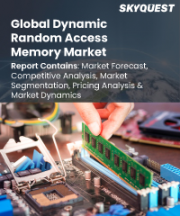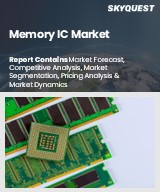
|
시장보고서
상품코드
1858771
스핀 전달 토크 자기저항 메모리(STT-RAM) - 시장 점유율과 순위, 전체 판매량 및 수요 예측(2025-2031년)Spin-Transfer Torque Random Access Memory - Global Market Share and Ranking, Overall Sales and Demand Forecast 2025-2031 |
||||||
세계의 스핀 전달 토크 자기저항 메모리 시장 규모는 2024년에 1억 2,600만 달러로 평가되었고, 2025-2031년의 예측 기간에 CAGR 8.6%로 성장하여 2031년까지 2억 3,500만 달러에 달할 것으로 예측됩니다.
본 보고서에서는 스핀 전이 토크 자기저항 메모리(STT-MRAM)에 대한 최근의 관세 조정과 국제적인 전략적 대응 조치에 대해 국경 간 산업 발자국, 자본 배분 패턴, 지역 경제의 상호의존성, 공급망 재구축 등을 종합적으로 평가합니다.
STT-MRAM은 자기 기억 셀의 자화 방향을 변화시키는 스핀 전이 토크 효과를 이용하여 데이터 쓰기와 저장을 가능하게 합니다. 각 비트 셀은 2개의 자석을 포함한 수직 배열 터널 접합과 결합된 트랜지스터로 구성되어 있습니다. 한 자석의 북극은 항상 위쪽으로 고정되어 있고, 다른 자석은 자유자석으로 북극이 위쪽과 아래쪽 방향을 전환하여 저장된 0 또는 1을 나타냅니다. 데이터 읽기/쓰기 작업은 스핀 편광 전류를 인가하여 자유 자석의 방향을 바꾸는 방식으로 이루어집니다.
2024년 세계 STT-MRAM 생산능력은 694만 개, 세계 판매량은 563만 6,000개에 달했습니다. 평균 판매가격은 대당 22.31달러로 평균 매출총이익률은 48.15%를 기록했습니다.
개발 동향
기술적 진보: 공정 기술의 미세화가 진행됨에 따라 28nm 이하 공정 기반의 STT-MRAM 제품이 시장의 주류가 될 것으로 예측됩니다. 동시에 2세대 수직 자기이방성(PMA) STT-MRAM 기술은 2028년까지 상업적 양산이 가능해져, 저장밀도를 크게 향상시키면서 단가를 낮출 수 있을 것으로 기대됩니다.
응용 분야 확대: 5G 통신, 인공지능, 인더스트리 4.0의 발전에 힘입어 STT-MRAM은 소비자용 전자기기, 산업자동화, 자동차 전장, 클라우드 컴퓨팅, 데이터센터 등 저전력, 고속 스토리지가 요구되는 분야에서 폭넓게 채택될 것으로 예측됩니다. 폭넓은 채용이 진행될 것으로 예측됩니다.
업스트림 및 하류에 미치는 영향
업스트림에 미치는 영향: 주요 업스트림 공급업체로는 자성 재료 제조업체와 반도체 제조 장비 제조업체가 있습니다. 자성 재료의 품질과 공급 안정성은 STT-MRAM의 성능과 제조 비용에 직접적인 영향을 미칩니다. 예를 들어, 고순도 자성 재료는 메모리 밀도를 높이고 전력 소비를 줄이는 데 필수적입니다. 반도체 제조 장비의 고도화는 STT-MRAM의 제조 공정 능력을 결정하며, 공정 기술이 미세화될수록 노광 장비와 에칭 장비에 대한 요구사항은 더욱 까다로워집니다.
다운스트림에 미치는 영향: 고성능 메모리 장치로서 STT-MRAM의 발전은 전체 다운스트림 용도의 기술 업그레이드와 제품 혁신을 촉진합니다. 민생 전자기기 분야에서는 스마트폰 및 웨어러블 기기의 동작 고속화 및 저전력화를 실현합니다. 자동차 전장 분야에서는 자율주행 시스템의 신뢰성과 응답 속도를 향상시킵니다. 데이터센터 분야에서는 서버 스토리지의 성능과 에너지 효율을 향상시킵니다.
이 보고서는 총 판매량, 매출, 가격, 주요 기업의 시장 점유율 및 순위에 초점을 맞춘 세계 스핀 전이 토크 자기 저항 메모리 시장에 대해 지역 및 국가, 유형 및 용도별로 종합적인 분석을 제시하는 것을 목표로 합니다.
본 보고서는 2024년을 기준 연도로 하여 2020년부터 2031년까지의 과거 데이터와 예측 데이터를 바탕으로 STT-RAM 시장 규모, 추정 및 예측치를 판매량(천대) 및 매출액(백만 달러)으로 제시하고 있습니다. 정량적, 정성적 분석을 통해 독자들이 사업/성장 전략 수립, 시장 경쟁 평가, 현재 시장에서의 포지셔닝 분석, 스핀 전이 토크 자기저항 메모리에 대한 정보에 입각한 비즈니스 의사결정을 내릴 수 있도록 돕습니다.
시장 세분화
기업별
- Everspin
- Avalanche Technology
- Renesas Electronics
유형별 부문
- 4Mb STT-MRAM
- 8Mb STT-MRAM
- 16Mb STT-MRAM
- 256Mb STT-MRAM
- 기타
용도별 부문
- 산업
- 기업 스토리지
- 항공우주 용도
- 기타
지역별
- 북미
- 미국
- 캐나다
- 아시아태평양
- 중국
- 일본
- 한국
- 동남아시아
- 인도
- 호주
- 기타 아시아태평양
- 유럽
- 독일
- 프랑스
- 영국
- 이탈리아
- 네덜란드
- 북유럽 국가
- 기타 유럽
- 라틴아메리카
- 멕시코
- 브라질
- 기타 라틴아메리카
- 중동 및 아프리카
- 튀르키예
- 사우디아라비아
- 아랍에미리트(UAE)
- 기타 중동 및 아프리카
자주 묻는 질문
The global market for Spin-Transfer Torque Random Access Memory was estimated to be worth US$ 126 million in 2024 and is forecast to a readjusted size of US$ 235 million by 2031 with a CAGR of 8.6% during the forecast period 2025-2031.
This report provides a comprehensive assessment of recent tariff adjustments and international strategic countermeasures on Spin-Transfer Torque Random Access Memory cross-border industrial footprints, capital allocation patterns, regional economic interdependencies, and supply chain reconfigurations.
STT-MRAM utilizes the spin-transfer torque effect to alter the magnetization direction of magnetic storage cells, thereby enabling data writing and storage. Each bit cell comprises a transistor coupled with a vertically aligned tunnel junction containing two magnets. One magnet's north pole is permanently oriented upward, while the other is a free magnet whose north pole can switch between upward and downward orientations to represent stored 0 or 1. Data read/write operations are performed by applying a spin-polarized current to alter the free magnet's orientation.
In 2024, global STT-MRAM production capacity reached 6.94 million units, with global sales totaling 5.636 million units. The average selling price was $22.31 per unit, yielding an average gross margin of 48.15%.
Development Trends
Technological Advancements: As process technologies continue to shrink, STT-MRAM products based on 28nm and below processes will gradually become the market mainstream. Concurrently, second-generation perpendicular magnetic anisotropy (PMA) STT-MRAM technology is expected to achieve commercial mass production by 2028, significantly increasing storage density while reducing unit costs.
Expanding Application Domains: Driven by advancements in 5G communications, artificial intelligence, and Industry 4.0, STT-MRAM will see broader adoption across consumer electronics, industrial automation, automotive electronics, cloud computing, and data centers-particularly in scenarios demanding low-power, high-speed storage.
Upstream and Downstream Impacts
Upstream Impact: Key upstream suppliers include magnetic material manufacturers and semiconductor equipment providers. The quality and supply stability of magnetic materials directly affect STT-MRAM performance and production costs-for instance, high-purity magnetic materials are crucial for enhancing storage density and reducing power consumption. The sophistication of semiconductor equipment determines STT-MRAM manufacturing process capabilities; as process technologies shrink, demands on lithography and etching equipment intensify.
Downstream Impact: As a high-performance memory device, STT-MRAM's advancement will drive technological upgrades and product innovation across downstream applications. In consumer electronics, it enables faster operation and lower power consumption in smartphones and wearable devices. In automotive electronics, it enhances the reliability and response speed of autonomous driving systems. In data centers, it improves server storage performance and energy efficiency.
This report aims to provide a comprehensive presentation of the global market for Spin-Transfer Torque Random Access Memory, focusing on the total sales volume, sales revenue, price, key companies market share and ranking, together with an analysis of Spin-Transfer Torque Random Access Memory by region & country, by Type, and by Application.
The Spin-Transfer Torque Random Access Memory market size, estimations, and forecasts are provided in terms of sales volume (K Units) and sales revenue ($ millions), considering 2024 as the base year, with history and forecast data for the period from 2020 to 2031. With both quantitative and qualitative analysis, to help readers develop business/growth strategies, assess the market competitive situation, analyze their position in the current marketplace, and make informed business decisions regarding Spin-Transfer Torque Random Access Memory.
Market Segmentation
By Company
- Everspin
- Avalanche Technology
- Renesas Electronics
Segment by Type
- 4 Mb STT-MRAM
- 8 Mb STT-MRAM
- 16 Mb STT-MRAM
- 256 Mb STT-MRAM
- Others
Segment by Application
- Industrial
- Enterprise Storage
- Aerospace Applications
- Others
By Region
- North America
- United States
- Canada
- Asia-Pacific
- China
- Japan
- South Korea
- Southeast Asia
- India
- Australia
- Rest of Asia-Pacific
- Europe
- Germany
- France
- U.K.
- Italy
- Netherlands
- Nordic Countries
- Rest of Europe
- Latin America
- Mexico
- Brazil
- Rest of Latin America
- Middle East & Africa
- Turkey
- Saudi Arabia
- UAE
- Rest of MEA
Chapter Outline
Chapter 1: Introduces the report scope of the report, global total market size (value, volume and price). This chapter also provides the market dynamics, latest developments of the market, the driving factors and restrictive factors of the market, the challenges and risks faced by manufacturers in the industry, and the analysis of relevant policies in the industry.
Chapter 2: Detailed analysis of Spin-Transfer Torque Random Access Memory manufacturers competitive landscape, price, sales and revenue market share, latest development plan, merger, and acquisition information, etc.
Chapter 3: Provides the analysis of various market segments by Type, covering the market size and development potential of each market segment, to help readers find the blue ocean market in different market segments.
Chapter 4: Provides the analysis of various market segments by Application, covering the market size and development potential of each market segment, to help readers find the blue ocean market in different downstream markets.
Chapter 5: Sales, revenue of Spin-Transfer Torque Random Access Memory in regional level. It provides a quantitative analysis of the market size and development potential of each region and introduces the market development, future development prospects, market space, and market size of each country in the world.
Chapter 6: Sales, revenue of Spin-Transfer Torque Random Access Memory in country level. It provides sigmate data by Type, and by Application for each country/region.
Chapter 7: Provides profiles of key players, introducing the basic situation of the main companies in the market in detail, including product sales, revenue, price, gross margin, product introduction, recent development, etc.
Chapter 8: Analysis of industrial chain, including the upstream and downstream of the industry.
Chapter 9: Conclusion.
Table of Contents
1 Market Overview
- 1.1 Spin-Transfer Torque Random Access Memory Product Introduction
- 1.2 Global Spin-Transfer Torque Random Access Memory Market Size Forecast
- 1.2.1 Global Spin-Transfer Torque Random Access Memory Sales Value (2020-2031)
- 1.2.2 Global Spin-Transfer Torque Random Access Memory Sales Volume (2020-2031)
- 1.2.3 Global Spin-Transfer Torque Random Access Memory Sales Price (2020-2031)
- 1.3 Spin-Transfer Torque Random Access Memory Market Trends & Drivers
- 1.3.1 Spin-Transfer Torque Random Access Memory Industry Trends
- 1.3.2 Spin-Transfer Torque Random Access Memory Market Drivers & Opportunity
- 1.3.3 Spin-Transfer Torque Random Access Memory Market Challenges
- 1.3.4 Spin-Transfer Torque Random Access Memory Market Restraints
- 1.4 Assumptions and Limitations
- 1.5 Study Objectives
- 1.6 Years Considered
2 Competitive Analysis by Company
- 2.1 Global Spin-Transfer Torque Random Access Memory Players Revenue Ranking (2024)
- 2.2 Global Spin-Transfer Torque Random Access Memory Revenue by Company (2020-2025)
- 2.3 Global Spin-Transfer Torque Random Access Memory Players Sales Volume Ranking (2024)
- 2.4 Global Spin-Transfer Torque Random Access Memory Sales Volume by Company Players (2020-2025)
- 2.5 Global Spin-Transfer Torque Random Access Memory Average Price by Company (2020-2025)
- 2.6 Key Manufacturers Spin-Transfer Torque Random Access Memory Manufacturing Base and Headquarters
- 2.7 Key Manufacturers Spin-Transfer Torque Random Access Memory Product Offered
- 2.8 Key Manufacturers Time to Begin Mass Production of Spin-Transfer Torque Random Access Memory
- 2.9 Spin-Transfer Torque Random Access Memory Market Competitive Analysis
- 2.9.1 Spin-Transfer Torque Random Access Memory Market Concentration Rate (2020-2025)
- 2.9.2 Global 5 and 10 Largest Manufacturers by Spin-Transfer Torque Random Access Memory Revenue in 2024
- 2.9.3 Global Top Manufacturers by Company Type (Tier 1, Tier 2, and Tier 3) & (based on the Revenue in Spin-Transfer Torque Random Access Memory as of 2024)
- 2.10 Mergers & Acquisitions, Expansion
3 Segmentation by Type
- 3.1 Introduction by Type
- 3.1.1 4 Mb STT-MRAM
- 3.1.2 8 Mb STT-MRAM
- 3.1.3 16 Mb STT-MRAM
- 3.1.4 256 Mb STT-MRAM
- 3.1.5 Others
- 3.2 Global Spin-Transfer Torque Random Access Memory Sales Value by Type
- 3.2.1 Global Spin-Transfer Torque Random Access Memory Sales Value by Type (2020 VS 2024 VS 2031)
- 3.2.2 Global Spin-Transfer Torque Random Access Memory Sales Value, by Type (2020-2031)
- 3.2.3 Global Spin-Transfer Torque Random Access Memory Sales Value, by Type (%) (2020-2031)
- 3.3 Global Spin-Transfer Torque Random Access Memory Sales Volume by Type
- 3.3.1 Global Spin-Transfer Torque Random Access Memory Sales Volume by Type (2020 VS 2024 VS 2031)
- 3.3.2 Global Spin-Transfer Torque Random Access Memory Sales Volume, by Type (2020-2031)
- 3.3.3 Global Spin-Transfer Torque Random Access Memory Sales Volume, by Type (%) (2020-2031)
- 3.4 Global Spin-Transfer Torque Random Access Memory Average Price by Type (2020-2031)
4 Segmentation by Application
- 4.1 Introduction by Application
- 4.1.1 Industrial
- 4.1.2 Enterprise Storage
- 4.1.3 Aerospace Applications
- 4.1.4 Others
- 4.2 Global Spin-Transfer Torque Random Access Memory Sales Value by Application
- 4.2.1 Global Spin-Transfer Torque Random Access Memory Sales Value by Application (2020 VS 2024 VS 2031)
- 4.2.2 Global Spin-Transfer Torque Random Access Memory Sales Value, by Application (2020-2031)
- 4.2.3 Global Spin-Transfer Torque Random Access Memory Sales Value, by Application (%) (2020-2031)
- 4.3 Global Spin-Transfer Torque Random Access Memory Sales Volume by Application
- 4.3.1 Global Spin-Transfer Torque Random Access Memory Sales Volume by Application (2020 VS 2024 VS 2031)
- 4.3.2 Global Spin-Transfer Torque Random Access Memory Sales Volume, by Application (2020-2031)
- 4.3.3 Global Spin-Transfer Torque Random Access Memory Sales Volume, by Application (%) (2020-2031)
- 4.4 Global Spin-Transfer Torque Random Access Memory Average Price by Application (2020-2031)
5 Segmentation by Region
- 5.1 Global Spin-Transfer Torque Random Access Memory Sales Value by Region
- 5.1.1 Global Spin-Transfer Torque Random Access Memory Sales Value by Region: 2020 VS 2024 VS 2031
- 5.1.2 Global Spin-Transfer Torque Random Access Memory Sales Value by Region (2020-2025)
- 5.1.3 Global Spin-Transfer Torque Random Access Memory Sales Value by Region (2026-2031)
- 5.1.4 Global Spin-Transfer Torque Random Access Memory Sales Value by Region (%), (2020-2031)
- 5.2 Global Spin-Transfer Torque Random Access Memory Sales Volume by Region
- 5.2.1 Global Spin-Transfer Torque Random Access Memory Sales Volume by Region: 2020 VS 2024 VS 2031
- 5.2.2 Global Spin-Transfer Torque Random Access Memory Sales Volume by Region (2020-2025)
- 5.2.3 Global Spin-Transfer Torque Random Access Memory Sales Volume by Region (2026-2031)
- 5.2.4 Global Spin-Transfer Torque Random Access Memory Sales Volume by Region (%), (2020-2031)
- 5.3 Global Spin-Transfer Torque Random Access Memory Average Price by Region (2020-2031)
- 5.4 North America
- 5.4.1 North America Spin-Transfer Torque Random Access Memory Sales Value, 2020-2031
- 5.4.2 North America Spin-Transfer Torque Random Access Memory Sales Value by Country (%), 2024 VS 2031
- 5.5 Europe
- 5.5.1 Europe Spin-Transfer Torque Random Access Memory Sales Value, 2020-2031
- 5.5.2 Europe Spin-Transfer Torque Random Access Memory Sales Value by Country (%), 2024 VS 2031
- 5.6 Asia Pacific
- 5.6.1 Asia Pacific Spin-Transfer Torque Random Access Memory Sales Value, 2020-2031
- 5.6.2 Asia Pacific Spin-Transfer Torque Random Access Memory Sales Value by Region (%), 2024 VS 2031
- 5.7 South America
- 5.7.1 South America Spin-Transfer Torque Random Access Memory Sales Value, 2020-2031
- 5.7.2 South America Spin-Transfer Torque Random Access Memory Sales Value by Country (%), 2024 VS 2031
- 5.8 Middle East & Africa
- 5.8.1 Middle East & Africa Spin-Transfer Torque Random Access Memory Sales Value, 2020-2031
- 5.8.2 Middle East & Africa Spin-Transfer Torque Random Access Memory Sales Value by Country (%), 2024 VS 2031
6 Segmentation by Key Countries/Regions
- 6.1 Key Countries/Regions Spin-Transfer Torque Random Access Memory Sales Value Growth Trends, 2020 VS 2024 VS 2031
- 6.2 Key Countries/Regions Spin-Transfer Torque Random Access Memory Sales Value and Sales Volume
- 6.2.1 Key Countries/Regions Spin-Transfer Torque Random Access Memory Sales Value, 2020-2031
- 6.2.2 Key Countries/Regions Spin-Transfer Torque Random Access Memory Sales Volume, 2020-2031
- 6.3 United States
- 6.3.1 United States Spin-Transfer Torque Random Access Memory Sales Value, 2020-2031
- 6.3.2 United States Spin-Transfer Torque Random Access Memory Sales Value by Type (%), 2024 VS 2031
- 6.3.3 United States Spin-Transfer Torque Random Access Memory Sales Value by Application, 2024 VS 2031
- 6.4 Europe
- 6.4.1 Europe Spin-Transfer Torque Random Access Memory Sales Value, 2020-2031
- 6.4.2 Europe Spin-Transfer Torque Random Access Memory Sales Value by Type (%), 2024 VS 2031
- 6.4.3 Europe Spin-Transfer Torque Random Access Memory Sales Value by Application, 2024 VS 2031
- 6.5 China
- 6.5.1 China Spin-Transfer Torque Random Access Memory Sales Value, 2020-2031
- 6.5.2 China Spin-Transfer Torque Random Access Memory Sales Value by Type (%), 2024 VS 2031
- 6.5.3 China Spin-Transfer Torque Random Access Memory Sales Value by Application, 2024 VS 2031
- 6.6 Japan
- 6.6.1 Japan Spin-Transfer Torque Random Access Memory Sales Value, 2020-2031
- 6.6.2 Japan Spin-Transfer Torque Random Access Memory Sales Value by Type (%), 2024 VS 2031
- 6.6.3 Japan Spin-Transfer Torque Random Access Memory Sales Value by Application, 2024 VS 2031
- 6.7 South Korea
- 6.7.1 South Korea Spin-Transfer Torque Random Access Memory Sales Value, 2020-2031
- 6.7.2 South Korea Spin-Transfer Torque Random Access Memory Sales Value by Type (%), 2024 VS 2031
- 6.7.3 South Korea Spin-Transfer Torque Random Access Memory Sales Value by Application, 2024 VS 2031
- 6.8 Southeast Asia
- 6.8.1 Southeast Asia Spin-Transfer Torque Random Access Memory Sales Value, 2020-2031
- 6.8.2 Southeast Asia Spin-Transfer Torque Random Access Memory Sales Value by Type (%), 2024 VS 2031
- 6.8.3 Southeast Asia Spin-Transfer Torque Random Access Memory Sales Value by Application, 2024 VS 2031
- 6.9 India
- 6.9.1 India Spin-Transfer Torque Random Access Memory Sales Value, 2020-2031
- 6.9.2 India Spin-Transfer Torque Random Access Memory Sales Value by Type (%), 2024 VS 2031
- 6.9.3 India Spin-Transfer Torque Random Access Memory Sales Value by Application, 2024 VS 2031
7 Company Profiles
- 7.1 Everspin
- 7.1.1 Everspin Company Information
- 7.1.2 Everspin Introduction and Business Overview
- 7.1.3 Everspin Spin-Transfer Torque Random Access Memory Sales, Revenue, Price and Gross Margin (2020-2025)
- 7.1.4 Everspin Spin-Transfer Torque Random Access Memory Product Offerings
- 7.1.5 Everspin Recent Development
- 7.2 Avalanche Technology
- 7.2.1 Avalanche Technology Company Information
- 7.2.2 Avalanche Technology Introduction and Business Overview
- 7.2.3 Avalanche Technology Spin-Transfer Torque Random Access Memory Sales, Revenue, Price and Gross Margin (2020-2025)
- 7.2.4 Avalanche Technology Spin-Transfer Torque Random Access Memory Product Offerings
- 7.2.5 Avalanche Technology Recent Development
- 7.3 Renesas Electronics
- 7.3.1 Renesas Electronics Company Information
- 7.3.2 Renesas Electronics Introduction and Business Overview
- 7.3.3 Renesas Electronics Spin-Transfer Torque Random Access Memory Sales, Revenue, Price and Gross Margin (2020-2025)
- 7.3.4 Renesas Electronics Spin-Transfer Torque Random Access Memory Product Offerings
- 7.3.5 Renesas Electronics Recent Development
8 Industry Chain Analysis
- 8.1 Spin-Transfer Torque Random Access Memory Industrial Chain
- 8.2 Spin-Transfer Torque Random Access Memory Upstream Analysis
- 8.2.1 Key Raw Materials
- 8.2.2 Raw Materials Key Suppliers
- 8.2.3 Manufacturing Cost Structure
- 8.3 Midstream Analysis
- 8.4 Downstream Analysis (Customers Analysis)
- 8.5 Sales Model and Sales Channels
- 8.5.1 Spin-Transfer Torque Random Access Memory Sales Model
- 8.5.2 Sales Channel
- 8.5.3 Spin-Transfer Torque Random Access Memory Distributors
9 Research Findings and Conclusion
10 Appendix
- 10.1 Research Methodology
- 10.1.1 Methodology/Research Approach
- 10.1.1.1 Research Programs/Design
- 10.1.1.2 Market Size Estimation
- 10.1.1.3 Market Breakdown and Data Triangulation
- 10.1.2 Data Source
- 10.1.2.1 Secondary Sources
- 10.1.2.2 Primary Sources
- 10.1.1 Methodology/Research Approach
- 10.2 Author Details
- 10.3 Disclaimer



















